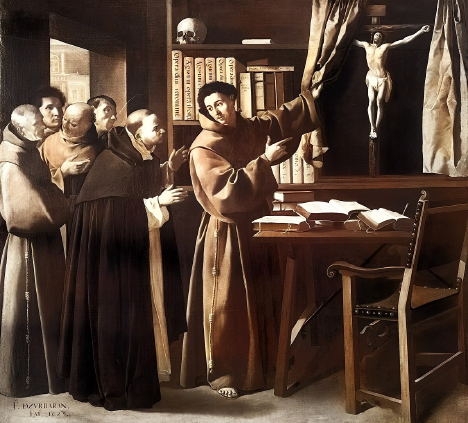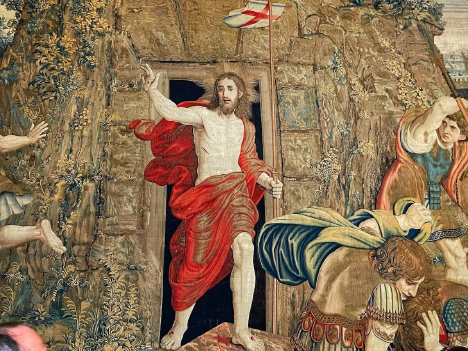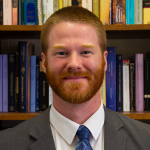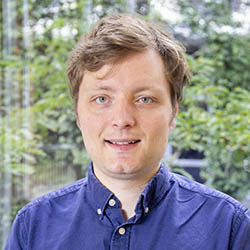Theology and Philosophy
Seek the Truths That Matter Most
Theology and philosophy exist in order to help students to answer life’s most important questions: Does God exist? Can we know who God is and what he wills for us? What is the ultimate meaning and purpose of life? Is there a real difference between good and evil? Is there life after death?
Philosophy answers these questions using the tools of natural experience and reason. It teaches students how to think critically, make good arguments, and communicate clearly. Philosophy enables us to demonstrate the “preambles of faith,” namely, the existence of truth, God, and the natural moral law.
Catholic Theology confronts life’s greatest questions through study of God’s supernaturally revealed Word in Sacred Scripture and Sacred Tradition. It does so with the help of philosophy, the natural sciences, and the insights of the saints, fathers and doctors of the Church. The theologian seeks to share in the mind of Christ, the eternal Wisdom and Word of the Father.
Why study Theology and Philosophy?

A philosophy major develops the critical thinking, ethical reasoning, and analytical skills that top employers demand—whether you're aiming for law or medical school, launching a career in tech, business, or public policy, or simply seeking a degree with one of the highest long-term earning potentials in the humanities. Philosophy majors thrive in diverse careers and on average experience one of the highest career salary growth rates of any major. For those aiming at graduate school, philosophy majors consistently score among the top tiers on the LSAT, GRE, and MCAT.
A theology major prepares you to participate in the evangelical mission of the Church. Theology graduates typically go on to teach in Catholic schools, work in parish or diocesan ministry, seek religious life or holy orders, or pursue graduate study in preparation for a career in academia. When taken as a second major, theology prepares students in law, healthcare, business and technology to sanctify the temporal order by performing their work in accord with the Gospel and the teachings of the Church. Professionals with a background in theology are equipped to work above all for the glory of God and in service of the sanctity of human life.
Regardless of your professional goals, the purpose of a Catholic university education is not only to help you succeed professionally. Above all, a Catholic education aims to cultivate intellectual and moral virtue–it seeks to form students who will habitually seek the truth, share the truth, and conform their lives to the truth. Students of philosophy and theology come to realize that truth is not merely a means, but also an end: certain truths are worth knowing for their own sake. These truths bring joy and give meaning and purpose to life. These types of truths are found above all in theology and philosophy, through which we come to know the source and summit of all truth, God.
Why Study Theology and Philosophy at SFU?
First, because of our Catholic and mission driven faculty. Our theology and philosophy faculty strive to serve Christ and build up the Church through teaching and scholarship that is faithful to the Magisterium and empowered by prayer, the sacraments, and devotion to the Eucharist. All faculty teach in accord with the principles set forth in Pope St. John Paul II’s Ex Corde Ecclesiae. And all full-time faculty make the Profession of Faith and Oath of Fidelity and receive the Mandatum from the local bishop. Our faculty strive not only to be great scholars and teachers; first and foremost, they strive to be saints.
Second, because our campus actively supports the pursuit of truth and virtue. Our thriving Campus Ministry program is run by Franciscan priests and FOCUS missionaries. We have daily Mass and frequent opportunities for Confession in our beautiful Immaculate Conception Chapel. Eucharistic Adoration is available every weekday in the St. Carlo Acutis chapel. Over 100 students attend weekly Bible studies and prayer groups, and Alta Via students study the faith and go on pilgrimage together to Rome and Assisi. Campus also features numerous places for prayer and reflection: the Lourdes Grotto, Pieta shrine, Stations of the cross trail, Nativity creche, Mt. Assisi and the Sunken Gardens.
Third, because you can study abroad and explore Catholic Europe. St. Francis students are able to spend a semester living and studying with students from our sister institution, the Franciscan University of Steubenville, at their renowned campus in Gaming, Austria.
Fourth, because of our location. Our campus is rural and scenic. There are ample opportunities nearby for hunting, fishing, hiking, and kayaking. Our area of Pennsylvania features numerous Byzantine Catholic Churches, the Traditional Latin Mass, and cloistered Catholic nuns. We are also only a 1.5 hour drive from Pittsburgh (Catholic shrines, Art and history museums, professional sports, dining and breweries, shopping, etc.) and just a few hours more from Philadelphia, Washington D.C., and New York City.
St. Francis of Assisi abandoned the pursuit of worldly glory in order to seek God and to serve Christ through a life of prayer, devotion to the Eucharist, preaching, and service to the needy. Here at SFU we strive to imitate his example and form students who will do the same. We hope that you will join us!
Curriculum & Courses
Theology, B.A.
Philosophy, B.A.
Compassionate Care Minor
Ethics Minor
Philosophy Minor
Theology Minor
Catholic Studies Minor

Questions?
Our faculty would love to hear from you!
Dr. Daniel Waldow

Department Chair
Theology Program Director
Assistant Professor of Theology
Dr. Brian Besong

Associate Professor of Philosophy
Philosophy Program Director
Dr. Gregory Stacey

Assistant Professor of Franciscan Theology